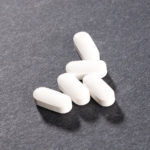By David Blyweiss, M.D.
We all know how healthful olive oil is. It can lower your risk of heart disease by reducing total and LDL (bad) cholesterol levels while raising your HDL (good) cholesterol levels. It can also help keep a lid on blood pressure. It’s also a tasty way to enhance the taste of food. But the olive tree can offer even more to enhance our health.
The olive tree occupies a prominent place in ancient history. Of course, olives and olive oil were dietary staples of the Mediterranean world. But the leaf of this venerable tree was also important as a way to treat infection and bring down fevers. It turns out that our Southern European ancestors were onto something. Scientists now know that olive leaves contain a number of natural antioxidants, including the flavonoids apigenin, luteolin, chrysoeriol, hesperidin, rutin, quercetin and kaempferol. But the most abundant compound in olive leaves is oleuropein—a substance with powerful antibacterial and antifungal properties.
In lab tests, oleuropein extract eradicates many of the bacteria and viruses that plague people. Various types of rhinovirus (a.k.a. the common cold), influenza and herpes viruses are among oleuropein’s victims, along with the bacterial bad guys E. coli and Staphylococcus aureus (the prime suspect in many hospital-acquired infections).
Viruses are especially difficult to vanquish—antibiotics can’t touch them—but olive leaf can prevent viruses from replicating by triggering immune cells to go on the attack. This effectively prevents the spread of infection. But fighting infection is only one of the ways that olive leaf can keep you healthy.
Like olive oil, olive leaf extract lowers blood pressure. Researchers in Germany and Switzerland have looked at how 20 sets of identical human twins with borderline hypertension responded to taking olive leaf extract. Two experiments were carried out. One compared twins who took 500 mg. of olive leaf extract a day at breakfast with a group of their siblings who didn’t. A second compared a group who took 500 mg. a day to those who took 1,000 mg. a day. At the end of the eight-week study, the group that took 1,000 mg. per day had dropped their systolic blood pressure (the “top” number) by an average of 11 points. The participants who received 500 mg. lowered their systolic blood pressure by five points. And those who took no supplements saw their blood pressure edge up by two points.
Olive leaf also reduces the risk of atherosclerosis by preventing platelets from clumping together. Both of these actions can help to prevent blocked arteries and heart attack. New studies show that olive leaf also may help diabetics by reducing blood sugar while improving insulin sensitivity. Plus, there is some evidence that olive leaf may have anticancer potential by inhibiting the proliferation of tumors.
Are You Suffering From...
- Love handles and a pot belly
- Romance that isn't what it used to
- Forgetfulness and inattention
- Low (or no) strength and endurance
- A sex drive that's shifted into neutral...or worse
If so...you may have Mature Male Burnout. Click here to discover more about this unique condition and what you can do about it.
The latest news from the olive grove: This bitter fruit and its leaves may also benefit your bones. French researchers, intrigued by the low occurrence of osteoporosis among people who consume olive-heavy Mediterranean diets, found that oleuropein reduces inflammation-induced bone loss. Although this research is preliminary and most of the testing has been done on cells in a petri dish or animals, the future of olive leaf’s broad healing potential looks promising.
If you want to get all of the benefits olive leaf extract has to offer, I suggest taking 500 mg. every six hours to treat a cold, the flu or other type of infection. To boost heart health, tame high blood pressure or benefit insulin sensitivity, take 500 mg. once per day. Just be aware that, regardless of the dosage or why you are taking olive leaf extract, it is best taken between meals.
References:
Pasquale RD. Effects of leaves and shoot of Olea europaea L. and oleuropien on experimental hypercholesterolemia in rat. Plantes Med Phytother 1991;25:134-40.
Perrinjaquet-Moccetti T. Food supplementation with an olive (Olea europaea L.) leaf extract reduces blood pressure in borderline hypertensive monozygotic twins. Phytotherapy Research. 2008; 22: 1239-1242.
Somova LI. Antihypertensive, antiatherosclerotic and antioxidant activity of triterpenoids isolated from Olea europaea, subspecies africana leaves. Journal of Ethnopharmacology. 2003;84: 299-305






